Mandingo Blu-ray Movie
HomeMandingo Blu-ray Movie 
Legend | 1975 | 127 min | Rated R | Sep 14, 2010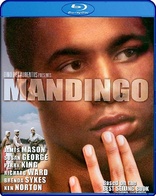
Movie rating
6.6 | / 10 |
Blu-ray rating
| Users | 3.8 | |
| Reviewer | 4.0 | |
| Overall | 3.8 |
Overview
Mandingo (1975)
Mede is a slave whose master, Hammond Maxwell intends on keeping him as a prizefighter. As Maxwell focuses his attention on his wenches and Mede's brutal training, his neglected wife turns her passions towards Mede himself.
Starring: James Mason (I), Susan George, Perry King, Richard Ward, Ken NortonDirector: Richard Fleischer
| Romance | Insignificant |
| Action | Insignificant |
Specifications
Video
Video codec: MPEG-4 AVC
Video resolution: 1080p
Aspect ratio: 1.78:1
Original aspect ratio: 1.85:1
Audio
English: LPCM 2.0
Subtitles
None
Discs
25GB Blu-ray Disc
Single disc (1 BD)
Playback
Region A, B (C untested)
Review
Rating summary
| Movie | 4.0 | |
| Video | 3.0 | |
| Audio | 4.0 | |
| Extras | 2.0 | |
| Overall | 4.0 |
Mandingo Blu-ray Movie Review
Is it finally time for an honest reappraisal of 'Mandingo'?
Reviewed by Jeffrey Kauffman April 28, 2011Okay, okay, let’s just get all of the jokes out of the way right off the bat. Even mention the name Mandingo and all sorts of ribald tales about the strapping black “buck” and the winsome, if conniving, Southern belle spring to mind. Mandingo was a sensation as a novel back in 1957 when it first flew off the bookstore shelves as a major bestseller, but it took the film industry almost two decades to screw up (so to speak) enough courage to even attempt a film adaptation. When Richard Fleischer’s Mandingo was released in 1975, it weathered a critical onslaught to become a huge box office phenomenon. Nonetheless, due to its problematic plotline and its copious nudity (including lots of full frontal from both males and females), it never quite matriculated to the broadcast networks, and the film more or less disappeared, usually thought of as a horrible embarrassment to all involved. None other than Quentin Tarantino once championed the film, however, comparing it to Showgirls (of all films) and stating its was a paradigm of major studio Blaxploitation. With all due deference to Mr. Tarantino, certainly an expert when it comes to niche genre and the filmic outré, Mandingo is about as far from Blaxploitation as Pulp Fiction is from Shakespeare. Now some 35-plus years since its initial release, revisiting the now infamous film is something of a minor revelation. When Roots became the 1970s defining television miniseries event, it ushered in what was then seen as a new understanding about the horrors of slavery. How odd that it had only taken two years for the public to forget about Mandingo, for the film is certainly a much more troubling and explicit exposé of those horrors. Unflinching, ugly and unapologetically decrepit, Mandingo is in a very real way Shakespearean tragedy writ across the southern experience in a way that makes more iconic films like Gone With the Wind seem like parlor game dress up parties. Now this is not to say that Mandingo ever attains the unabashed greatness of the Gable-Leigh starrer, but for anyone wanting an unforgettably visceral feeling for what the Antebellum South may have really been like, there is nothing quite like Mandingo, for better or worse.
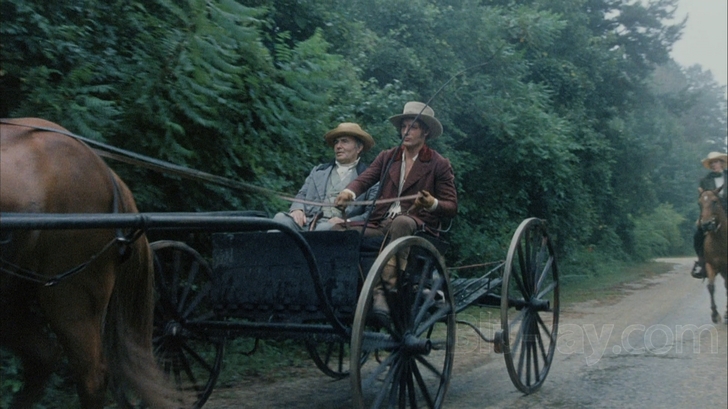
Richard Fleischer came from a noted, if maligned, Hollywood family. His father was iconic animator Max Fleischer, a man who dared to challenge Disney’s dominance and utterly failed. Fleischer fils followed in his father’s scrappy footsteps, entering the directing field with a series of well regarded noirs in the 1940s, including one of the best remembered of all films in that genre, The Narrow Margin. The 1950s and 1960s saw him foray into big budget spectacles, ironically enough including Disney’s 20,000 Leagues Under the Sea. While Fleischer attempted everything from science fiction (Fantastic Voyage, Soylent Green) to musicals (the Rex Harrison Doctor Dolittle), certainly nothing in his oeuvre would have suggested he would be the sort of director to tackle the admittedly salacious subject matter that is at least part of what no doubt drew large throngs of viewers to Mandingo. But what is so impressive about this film from our modern day vantage point is just how stone cold soberly Fleischer confronts the absolute degradation of slavery and the dissolute lives of the slave owners. Rarely has a film about this barbaric practice been so clearheaded and almost defiantly dispassionate.
James Mason portrays Warren Maxwell, owner of Falconhurst, an aging plantation that has definitely seen better days. Warren’s son Hammond (Perry King) is a conflicted lad who is literally hobbled by a childhood injury to his leg which makes him shy around white women even as he has no problem bedding “wenches” (the dismissive term for the female black slaves who were seen as property to be used for sexual gratification). Hammond falls in love with one of these so-called wenches, Ellen (Brenda Sykes), even as his father is urging him to “get down to business” (an actual quote from Warren) and father an heir by a white woman, preferably demure belle Blanche (Susan George). Blanche is a conniving woman out to escape a stifling family environment and she’s not above lying about her less than virginal state, something that Hammond manages to figure out anyway on their wedding night, leading to marital discord. In the meantime, Hammond has purchased Mede (Ken Norton), a Mandingo whom Hammond wants to use in slave fights. When Blanche discovers Ellen is pregnant with Hammond’s child, the stage becomes set for a revenge scenario that rises to epically tragic heights as the film reaches its violent conclusion.
Mandingo is a startlingly bracing experience, especially those of us who were raised in a politically correct environment where even thinking the “N-word” clad us in self-reprobation and enormous guilt. Here the “N-word” is bandied about with almost careless glee, and when Warren goes on an epic screed about how the blacks (of course he doesn’t use that term) obviously have no souls, some jaws may drop. But that is the power of this film. Nothing is sugar coated, and indeed this is about the most astringent depiction of slave owners ever captured on film. The sheer idiocy of these people is highlighted by Warren’s firm belief that he can thrust his rheumatism out of his body by simply pressing his feet into the belly of a small slave boy. Warren can’t walk due to his affliction, and Hammond can barely walk due to his, and both are living glyphs of a crippled south attempting to exert dominance over a people who are arguably not just more physically able, but certainly more morally attuned to their own humanity.
This is a film which makes the mossy dank confines of the Gothic South palpable and unforgettable. The best aspect from the crew contributions comes from the inimitable Boris Leven, who offers one of his most evocative production designs, bringing Falconhurst to fetid life and exploring various other locales with a brilliant flair. On the other hand, the underscore is not completely effective. I’ve taken a lot of heat from film music lovers for my occasional disparagement of Maurice Jarre, a composer whom I unabashedly love but whom I often think contributes completely anachronistic scores that are often at cross purposes with the films they purport to support. He’s a bit more reserved here in Mandingo, but he never quite captures a true Southern musical patois, despite attempting to quote various folk tunes. Norman Wexler’s screenplay is brisk and often quite frightening, managing to walk a fine line between hyperbolic drama while avoiding self- parody.
The performances of Mandingo, specifically Susan George’s, were unabashedly lambasted when the film was first released, but taken now with some 20/20 hindsight, they are uniformly brilliant. Mason’s work here is certainly among his finer late-career portrayals. His Warren Maxwell is thoroughly despicable, but never over the top. King’s Hammond is brilliantly understated and perfectly nuanced. Ken Norton’s Mede is stoic and stalwart, and his physical presence is undeniably commanding. The incredible Lillian Hayman and a very, very impressive Ji-Tu Cumbuka do amazing work as two of the slaves at the Maxwell plantation who know their plight is unjust but who are unable to effectively fight “the machine.” And as for George: well, I personally think critics completely missed the point of her, yes, over the top portrayal of Blanche. Blanche is an hysteric, and a conniving one at that. She uses her tantrums and “vapor spells” to her own benefit, and as such, George is portraying a character who herself is “acting,” and as such, she does very effective work.
There's little doubt that Mandingo is not an easy film to watch. Its unapologetically brusque look at a brutal practice never averts its filmic eyes from the epic tragedy which confronted slaves at every moment of their lives. As commendable as Roots was, it never really approached the horrific heights (or depths, depending on your point of view) that Mandingo does. As an unflinching portrait of a decrepit "institution," Mandingo is, to put it simply, a one of a kind film experience. The fact that it's unforgettable certainly has nothing to do with it supposedly being camp, for it just as certainly is not camp, it's far too serious for that rubric. Maybe from our neo-modern, ultra-jaded cynical sensibility, we can finally see Mandingo for the gut wrenching experience it is.
Mandingo Blu-ray Movie, Video Quality 
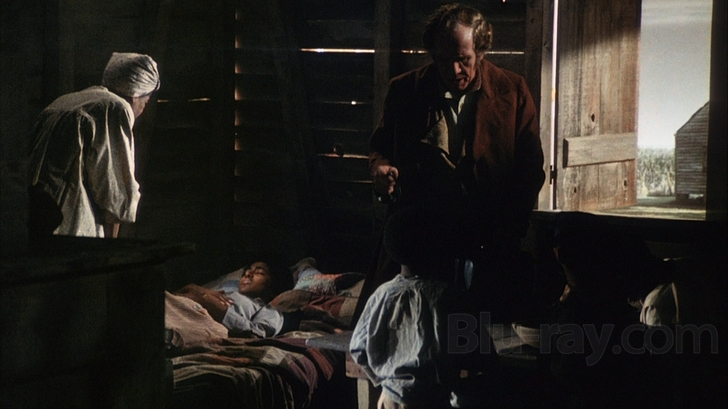
DNR-phobes take note: not a stitch of restoration or clean up has been slathered on Mandingo, which arrives on Blu-ray from Legend Films with an AVC encoded 1080p transfer in 1.78:1. The master utilized here is filled with scratches, white flecks and a variety of other damage which will probably drive some people, including, yes, DNR-phobes, a little batty. And the image is also on the soft side, at least with regard to the opticals involving the opening and closing credits, and colors are often just slightly faded. But if you can get past those issues, this is really a pretty decent looking Blu-ray, full of the deliberately dark and often monochromatic work of DP Richard H. Kline. Colors, while not overly robust, are accurately rendered here, if the film seems to err a bit on the red side of the spectrum. In fact it's in the reds that this film really shows its deepest saturation, whereas greens appear slightly murky and black looking. Fine detail is very good in close-up shots, and grain is certainly still completely apparent. This release lies in stark contrast to some of the other catalog (public domain) releases that have been scrubbed to within an inch of their lives. This may have more than its fair share of damage, but the good news is, it hasn't been artifically tweaked.
Mandingo Blu-ray Movie, Audio Quality 
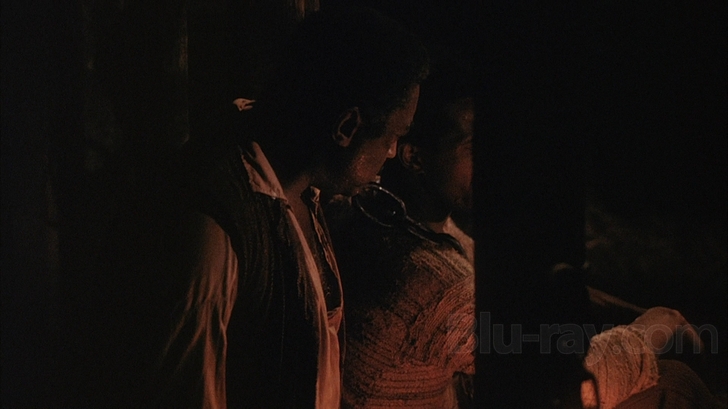
Legend has very nicely provided an excellent lossless LPCM 2.0 audio mix for this film. While there's obviously a narrow soundfield, fidelity here is excellent and the soundtrack does not seem to have any damage or even outright hiss to report. Highs and lows sound full and natural, and Jarre's score is very well reproduced, including the great Muddy Waters blues number "Born in this Time." Dialogue is clear, though some of the Southern accents get a bit thick some of the time and may therefore be a bit hard to decipher. Dynamic range is well modulated and a couple of boisterous sequences, including some gunshots, provide some appealing low end.
Mandingo Blu-ray Movie, Special Features and Extras 
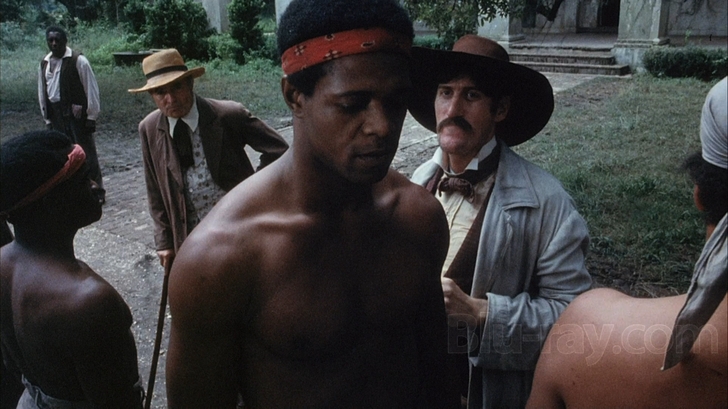
Press Kit Slideshow (HD; 2:59) plays to the Muddy Waters tune utilized in the film, and shows a series of stills with captions from the pressbook.
Mandingo Blu-ray Movie, Overall Score and Recommendation 
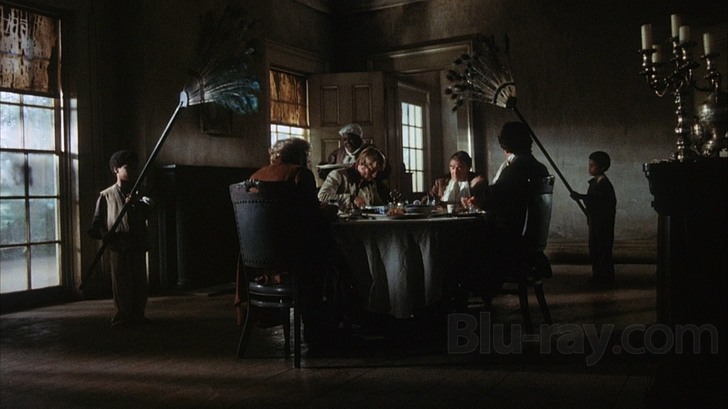
I came to Mandingo expecting a camp-tastic laughathon that I'd be able to easily disparage. Imagine my immense surprise when I was sucked hook, line and sinker into an extremely involving, and very disturbing, account of the very real horrors of slavery. Yes, there are certainly melodramatic elements to the basic storyline of Mandingo, but the clearheaded, unsensationalized direction of Fleischer anchors this piece in a rather alarming sense of reality. Bolstered by a beautiful production design and several expert performances, Mandingo deserves a major critical reevaluation. This Blu-ray presents an unadorned image and a nice lossless audio mix. Believe me, no one is more surprised than I am to tell you that Mandingo is Highly recommended.
Similar titles
Similar titles you might also like

Brawl in Cell Block 99 4K
2017

Drum
1976

Gun Woman
2014

Shock
Schock / Beyond the Door II
1977

Lemora: A Child's Tale of the Supernatural
1973

Scars of Dracula
1970

Black Samurai
1976

Starry Eyes
2014

Frankenstein
2015

All-American Murder
1991

Death Dimension
1978

The Human Tornado
1976

The Legend of the 7 Golden Vampires
The 7 Brothers Meet Dracula
1974

Slaughter
Kill Julian Drake
1972

Death Bed: The Bed That Eats
1977

The Institute
2017

The Night of the Hunted
La nuit des traquées | Indicator Series | Limited Edition
1980

Foxbat
1977

The Candy Tangerine Man
1975

Dan Curtis' Dracula
Bram Stoker's Dracula
1974
